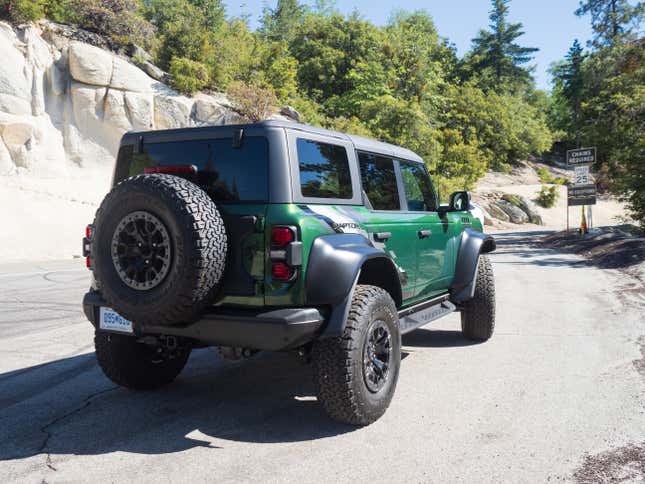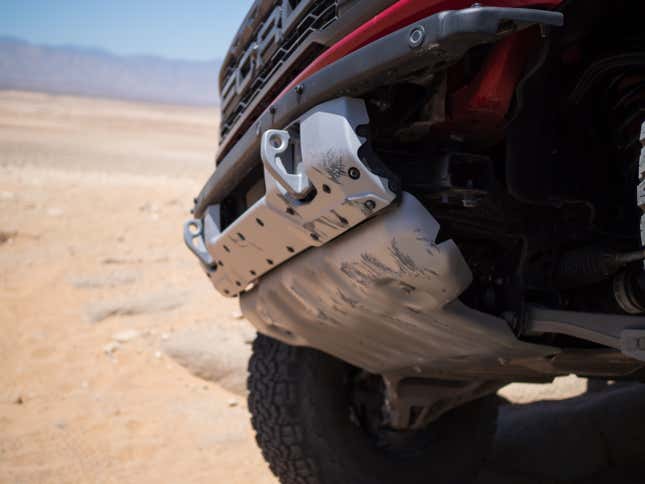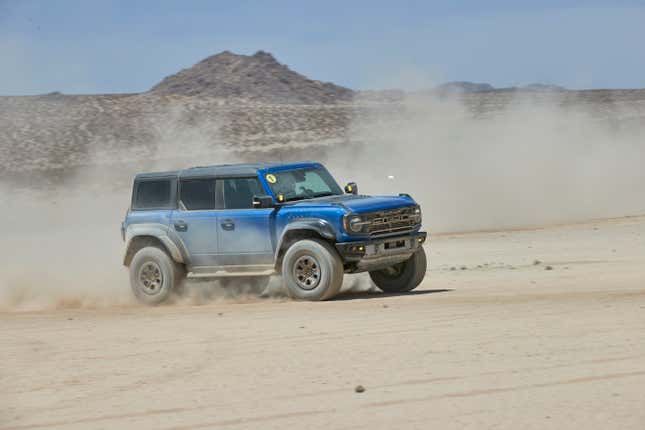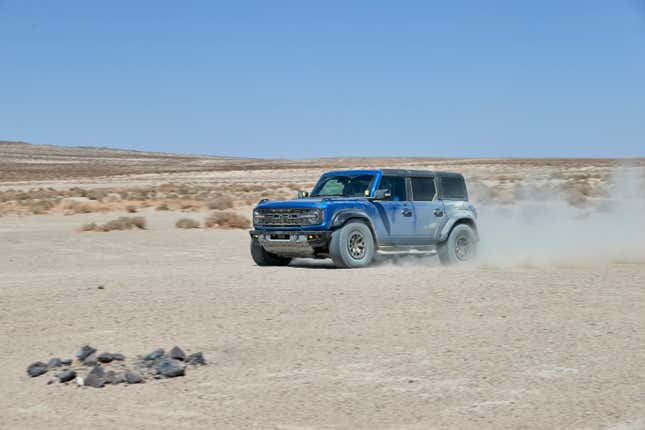The Ford Bronco Raptor has been a long time coming, and I’m happy to report that the wait has been worth it. When Ford announced the return of the Bronco in 2020, many off-road enthusiasts in the U.S. were convinced the Bronco would be unable to depose the Jeep Wrangler as king of the hill. While the Bronco could make its fight against the Wrangler, ultimately, it would lose because of its independent front suspension. Or so they said.
Whereas the Jeep Wrangler tolerates the on-road discomfort of a solid axle suspension, the Bronco was happy to cede a bit of skill off-road for better handling thanks to IFS. Well, not anymore: the Ford Bronco Raptor can rock crawl, and desert run and even carve a canyon — all while being a decently comfortable daily driver. Provided that you can get past its obnoxiously wide fenders.
Full disclosure: Ford invited me to Palm Springs, California to drive the beefy Bronco Raptor. The company flew me out, put me up in a nice hotel and even fed me grits. The Ford Performance team took me to Johnson Valley, where we drank lots of water and ate salty snacks. Then, for some reason, the team thought it’d be a good idea to let a first-timer like me rock crawl and speed over trails best left to the professionals who race in The King of the Hammers.
All-New Bronco Raptor, All-New Specs
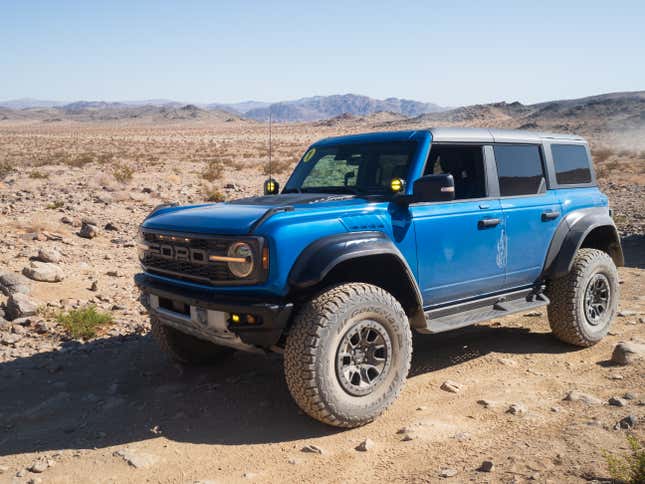
Those wide Bronco Raptor fenders barely cover the standard 37-inch BFGoodrich All-Terrain KO2s fitted on 17-inch alloy wheels. From fender to fender, the Bronco Raptor is 85.7 inches wide, a full 9.8 inches wider than the base Bronco. You might as well round up to ten inches, because a difference of almost one foot is a good way to visualize the Raptor.
The wheelbase is 116.5 inches, same as all four-door Broncos; sadly, a two-door Bronco Raptor will not be available. For that matter, neither will a manual transmission. I feel as frustrated as you, but more on that later. Let’s talk suspension.
In order to make the Bronco into an Ultra4 vehicle for average drivers, Ford Performance says it focused on the frame and suspension. FP took parts from the F-150 Raptor and adapted them to the Bronco chassis, which is based on the Ranger. These adapted parts include stronger A-arms and knuckles, plus a few modifications unique to the Bronco Raptor, like taller shock towers to fit new, bigger semi-active dampers. The Raptor has a Dana 44 front axle and a Dana 50 rear, both with electronic lockers and 4.70 gears.
These modifications don’t change the Bronco’s bones as much as reinforce them. Here’s the Bronco Raptor chassis with upgraded components highlighted: Blue is for frame changes, and yellow is for suspension upgrades.
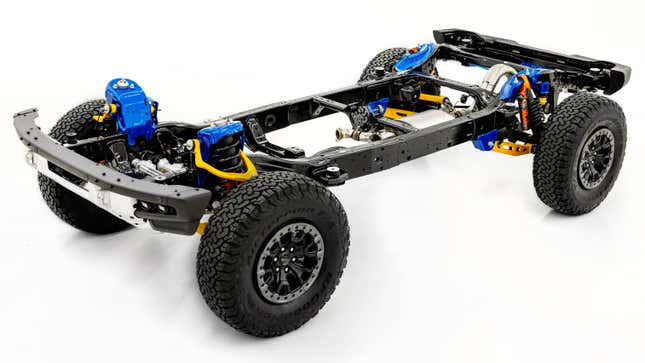
All in all, the changes make the best of the Bronco’s IFS and five-link solid rear axle. The track is 8.6 inches wider, and the suspension upgrades give the Bronco Raptor 13 inches of front wheel travel, 14 inches at the rear. The Bronco Raptor has an approach angle of 47.2 degrees, while breakover is 30.8 and departure is 40.5. The changes and reinforcements added 1,000 pounds to its towing capacity, for a new max rating of 4,500 pounds.
I’m not kidding about the fenders. The Bronco Raptor is so wide, I bumped into the damn thing more than once while walking around it shooting pictures. I wore my folly proudly: a chalk-white tire print on blue chinos that spanned the length of my leg.
But wider fenders, bigger tires and a better suspension didn’t earn the Bronco a Raptor badge by themselves. The engine needed upgrades and the transmission did, too. FP gave this Raptor an exclusive twin-turbo 3.0-liter V6 engine, which makes 418 horsepower at 5,750 rpm and 440 lb-ft of torque at a low 2,750 rpm. So right before the tach hits 3,000, the Bronco shoves you back and you’ll hear the turbos whine, a high-pitched, flat sound from the horses’s snout.
It’s a bit unnerving to propel forward that forcefully, tucked in the driver seat of a Bronco Raptor weighing 5,731 pounds. That’s curb weight, mind you. When it’s moving, the Bronco Raptor feels like it leaves a third of its weight behind.
Bronco Raptor Let Loose in the City
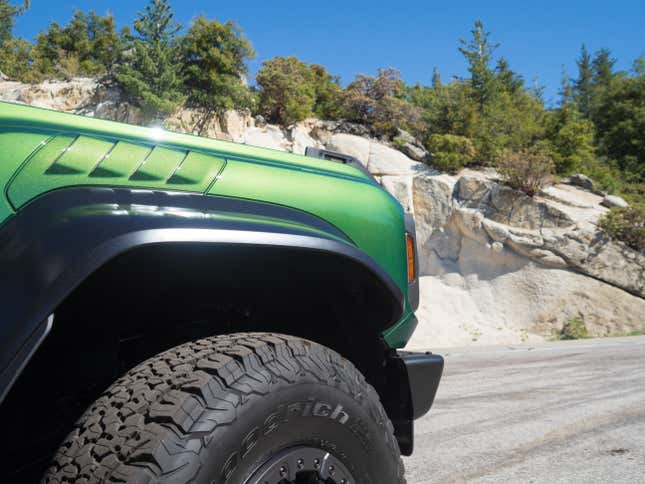
The Bronco’s performance snuck up on me. I’ll be honest: I hated it at first.
The first leg of the drive was in Palm Springs, on narrow city streets. Of course, the streets weren’t all that narrow; they just felt that way behind the wheel of this extra broad machine. I used the black tie-downs at the leading edges of the hood to see where I was in my lane, like rifle sights at the business end of the Bronco. It wasn’t the best strategy, considering how far the fender flares reach past the width of the hood.
Luckily, the seating position is pushed far to the left. I think Ford did a good job of putting the driver where visualizing a vector is pretty easy.
In town, the Bronco Raptor was loud and angry. It held gears too long and blipped the throttle whenever I would slow at a stop light. It also revved to high hell. Great, I thought. Another oversized off-roader with an unabashed connection to the Cretaceous Period, which can’t see over its own hood to spot the irony in front it. Can’t we just leave these old things in the past?
I glanced down to check what gear I was in as I was taking off at the next light and, sure enough, the ten-speed automatic transmission got to third before I cleared the intersection. Then, it just held on. I paddle-shifted to fourth gear and the Bronco Raptor settled. That’s when I noticed I was in Sport mode, one of seven drivetrain settings. There’s Normal, Slippery, Tow/Haul, Sport, Off-Road, Rock Crawl and Baja. You’ll mostly want Normal around the city. After switching modes, the Bronco became civil. Sort of.
It wasn’t a whole different animal, but it was slightly more tame. The revs still hung on longer than I’d like, because Ford Performance wants the turbos spooling for lag-free spirited driving. But even on mild modes, the tension never fully goes away. I had little choice but to get used to it. Halfway into my drive, I even became fond of it.
Next was a long drive in San Bernardino National Park, winding through mountain passes. I fully expected to coast through. But the Bronco Raptor stomped my expectations to dust.
Bronco Raptor Can Handle Twisty Roads
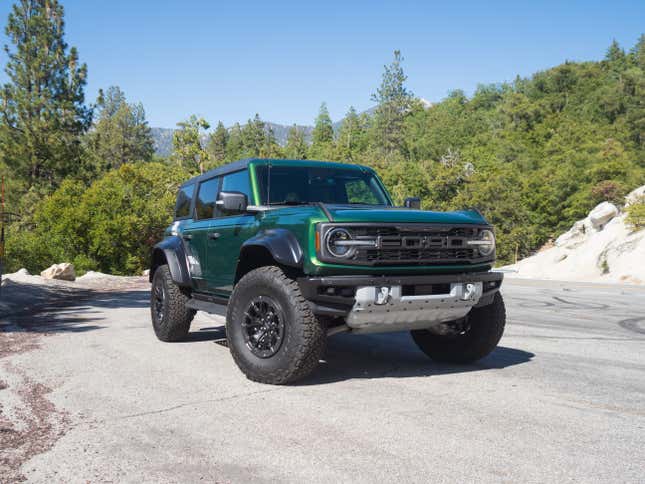
Visually, the Bronco Raptor seems like it would be a killer off-roader and ponderous everywhere else. But look again: Eager twin-turbo engine, dual exhaust, fine-tuned suspension, stiffer chassis, and a crazy-wide track. That all sounds like sports car stuff. And wouldn’t you know it, this thing is super stable in corners.
The Raptor will point its snout into a turn and hold that line just like a sports car. Almost like another horse from the FP stable, the Mustang GT500. It’s hard to believe, but the Bronco Raptor is incredibly fun to drive on twisty roads.
And I didn’t mention this earlier because I wanted to call it out specifically: the transmission in the Bronco Raptor is incredibly good. It’s the same ten-speed automatic that comes in other Broncos, but it gets an extra cooler here.
The transmission isn’t just precise; it’s prescient. It knows what you’re going to do before you do it, and makes sure the engine keeps pace. After I got to know the transmission — and after it got to know me — I was head over heels in love.
Again, it hangs onto gears longer than you’d expect in a 4x4 (third and fourth especially). But when you’re bombing down a back road, the transmission keeps you right in the engine’s sweet spot, where the turbos are spooled and the torque is ever-ready. I’m not ashamed to say it: that ten-speed knows better than me. The paddle shifters are big and easy to reach, but I used them sparingly. There was simply no need.
After I’d left San Bernardino, winding down some 5,000 feet of descent, it was mostly highway driving. In tenth gear, the Bronco will cruise at 60 to 80 completely unfazed, offering a comfortable ride over the expressway. The big tires are surprisingly good here! I heard zero drone despite their 37-inch diameter and aggressive tread.
The problem on the highway isn’t the tires — it’s the wind noise. I understand that people love raising the roof off-road, but it comes at the expense of comfort. At highway speeds, there’s enough noise in the cabin that you’ll have to crank the stereo to mid-to-high volume. If there’s no music, or if you and your passenger like to chat, the rush of wind is unavoidable, even with the hardtop.
And while we’re on the subject of comfort, the interior of the Bronco Raptor is just okay. The seats have thick bolsters and suede-like upholstery. The dashboard is wrapped in marine-grade vinyl. Both the gear selector and steering wheel have thickly-padded leather with orange accent stitching. The touch points are fine!
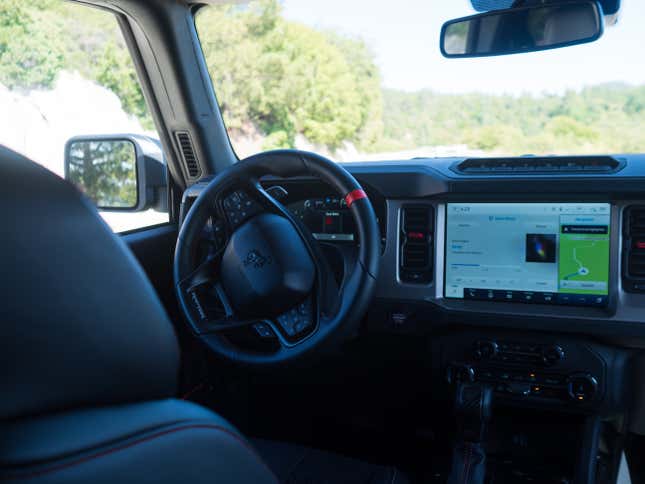
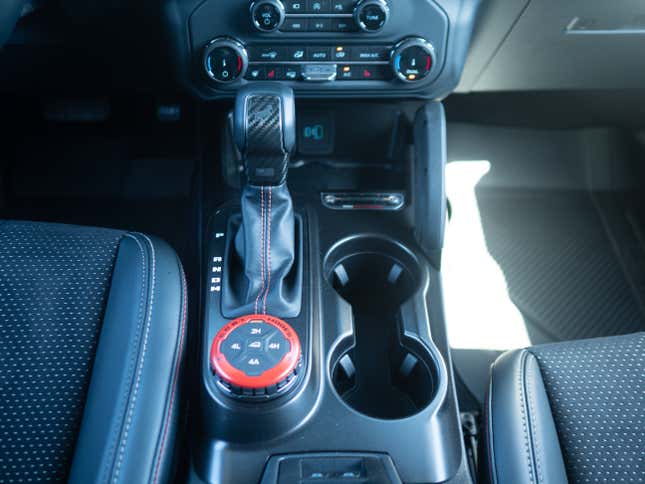
But the plastics in the center column feel like Ford pulled them out of a base model economy car. And Ford probably did! I’m guessing this saved quite a bit, because all the plastic that drivers won’t routinely touch feels too pliant, almost flimsy.
To give Ford the benefit of the doubt, the interior seems weather-resistant and easy to clean. That’s not unreasonable, since the dirt really is the natural habitat for this machine.
Bronco Raptor Off-Road, On Trail
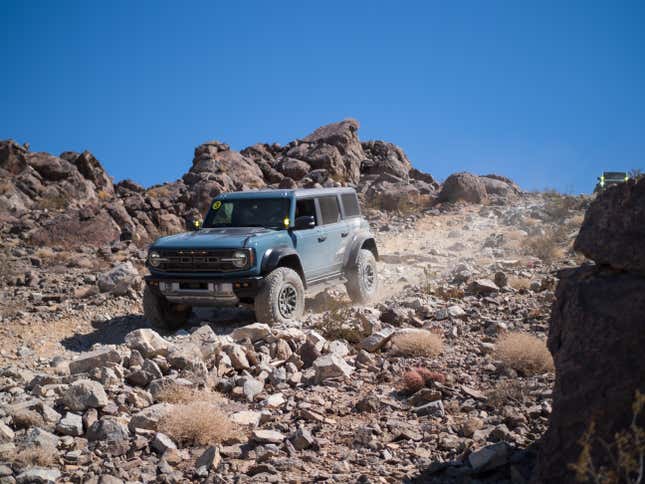
Fans insist the Jeep Wrangler is not so great on the road because it belongs off-road. The Bronco Raptor proves it really doesn’t have to be that way. The Bronco was already good off-road; the Raptor builds on that, expanding this rig’s prowess. This test took us through mild trails, then a short and sweet rock crawl (where I got stuck, twice), and finally, over a long, sandy course full of ruts and washboards where Ford insisted we should go fast.
We broke into three packs of Raptors and ventured into Johnson Valley in a staggered formation. Each pack had a lead and chase vehicle, all Bronco Raptors with someone from Ford Performance at the wheel. We rode on aired-down tires set to 25 psi up front, 23 out back. Not once did we stop to air up or down, even though we tackled a variety of conditions.
Mark Lecrone, a vehicle integrations supervisor at Ford Performance who worked on the Mustang GT350, Mustang GT500, F-150 Raptor, and, now, the Bronco Raptor, showed me how to dial in the settings. “Set it to Sport. Or Baja, if you want,” Mark said. “Press the R button on the wheel to see your settings.” The settings he was referring to were steering, exhaust, and suspension. These each have three to four options, which are how the Bronco Raptor goes seamlessly from Dr. Jekyll to Mr. Hyde.
Mark also explained how to toggle One-Pedal Driving, which helped on the trails, but hurt at the rock crawl. He gave me a crash course on traction that I distilled into a prayer three words long: Rock. Center. Mass.
Mark told me to drive over any rock taller than 13 inches. Hit it head on with the tire, he said, which is pretty much the opposite of what I would’ve done. I would have tried my best to avoid big rocks, and steer us around. But after flipping that switch in my head, I had a blast stepping on every single rock or boulder in my path with the Raptor’s BFG boots. I was like a kid who just learned to climb stairs two at a time. Leaps and bounds. Man, I wanted to run over rocks all day. Just be careful what you wish for.
Bronco Raptor Can Finally Rock Crawl
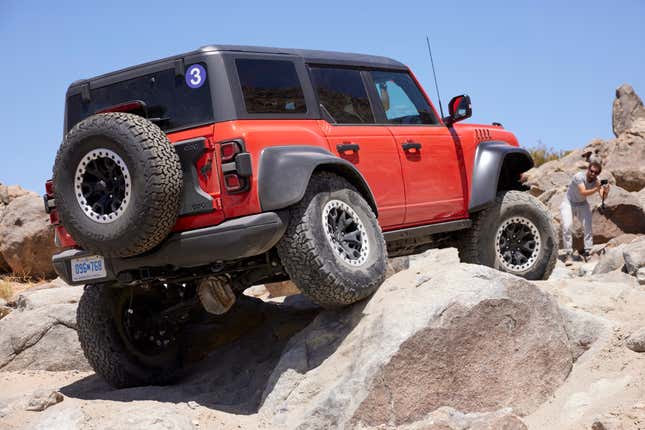
The first leg of the off-road drive took us over trails that looked well worn, and though we had a few close calls, the pack ran right through. There were two places that required a spotter, but they were nothing major. In these technical spots, the Bronco’s One-Pedal Driving helped a lot. This assist applies the brakes any time you lift off the throttle, so you only have to focus on one pedal. It can help drivers who haven’t mastered how to left-foot brake yet. In other words: Me.
With One-Pedal toggled on and the drive mode set to either Off-Road or Rock-Crawl, even a novice (me again!) will feel like a professional. Thanks to a bunch of exterior cameras, the center screen shows what you’re driving over, along with a trajectory based on the position of the steering wheel. These features make the Bronco Raptor easy to off-road, but they’re no substitute for experience.
At the second trail section that called for a spotter, the Ford Performance guides warned us we were about to do some real rock-crawling. I chuckled, thinking it was a joke. It wasn’t. I only realized the truth as we reached a hill of piled rocks the size of cars. Nah, I thought. That’s not possible.
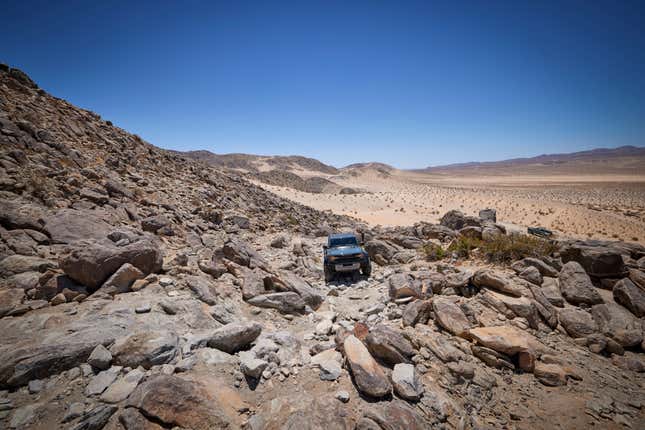
Or if it is, who needs to drive over that thing, and why? Pro drivers, for one. There was at least one with us, actually, in her own road-test Raptor: Shelby Hall, granddaughter of legendary Baja racer Rod Hall and a veteran of the family vocation. I really didn’t want to try to rock-crawl after her! Later, a Ford Performance rep told us the hill we were crawling was part of the King of the Hammers competition course. Of course, Hammers racers bomb right over the hill, rather than stopping and starting at a snail’s pace like a bunch of journalists.
I wasn’t content to just go slow. No: I went slow and got stuck, twice. I’d like to blame the unfamiliar One-Pedal mode, but that’s just ego. The truth is, I had never rock-crawled like this before. I couldn’t fall back on a wealth of experience; I was spurred on by an adrenaline spike.
As I felt my lack of experience catching up with me, I was convinced I would catch an axle somewhere and rip it right out. Or I’d crush my differential and beach Ford’s beautiful new machine.
The worst that happened was a few scrapes and scratches to the skid plates, which run the length of the Bronco Raptor’s underside. The Raptor even has removable running boards and bumper end caps, all of which come off with hand tools. My Bronco made it out just fine, even if I was shook. I kept trying to gun it over the rocks! When One-Pedal is on, it’s a little hard to feather the throttle. It doesn’t really respond until about 20 or 30 percent of the pedal travel, and by then it was too late for my heavy foot. Finally, one spotter suggested I try left-foot braking.
That smoothed me right out. I was able to better modulate the brake and throttle by treating them like a clutch and throttle. Lift a little here, press a bit more there. I quickly became unstuck. I didn’t notice until then that I was holding my breath, and I finally let out a sigh of relief.
Bronco Raptor Still Rips on Desert Runs
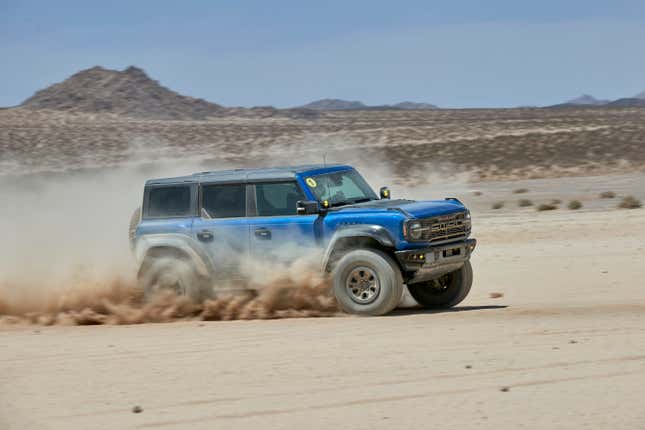
After my adventure on the rocks, I was more or less spent. But there was one more test: high-speed desert runs. Now, I already knew that bombing over sand at high-speeds is a Raptor specialty, but knowing isn’t doing. As expected, the Bronco Raptor was utterly unfazed by deep ruts and loose sand. In fact, the faster you go, the more sure-footed the Bronco feels.
The stability of the wide-track Raptor goads you into going faster. Once or twice (maybe three times), I overcooked it in a corner and felt the rear start to come around. But even then, it was easy to catch and keep under control.
Mark reminded me at the course’s starting line: smooth inputs. You want some suspension travel coming into a corner, he explained. Slamming the brakes will pitch the front end down, reducing the effectiveness of the semi-active dampers.
The move is to scrub enough speed before tapping the brake pedal at turn-in, keeping the front suspension pliant, ironically enough, so it can pull on the Bronco’s reigns firmly and keep it on its line. At most speeds — over asphalt, hard-pack and loose sand alike — the Bronco Raptor remained predictable. It won’t buck off newcomers. And that kind of confidence, that rewarding input-feedback loop, is vital.
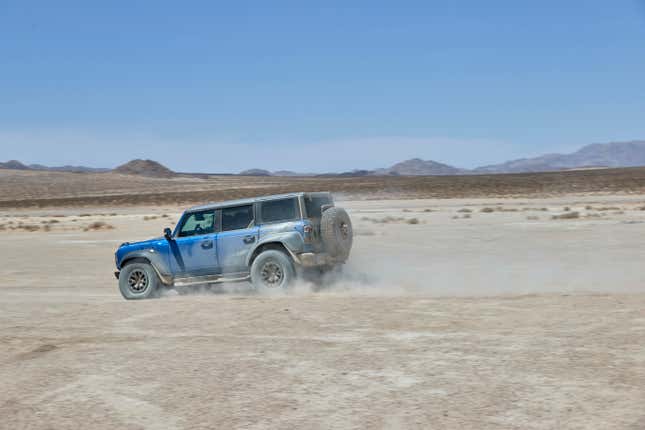
Of course, I’d be lying If I said I went WOT with reckless abandon. I didn’t. I mean, the Bronco Raptor can move, but it’s still a big SUV — a 5,700-pound, 86-inch wide machine that didn’t belong to me, one I wasn’t keen to flip over. The few times I opened the throttle was mainly to test stopping power. Big tires, big wheels, big brakes, right? The Bronco Raptor has four-piston calipers and 13.8-inch rotors up front. The brakes are progressive and firm, but get a bit mushy as the pedal bottoms out.
The handling and maneuvering portion of the off-road drive had a series of brake boxes: short rectangular strips marked by cones at four corners, inside of which we were supposed to make a complete stop. The boxes seemed short to me. I doubted the Bronco Raptor could whoa up inside the cones. But it did, and it managed to stay stable. I’m talking about going WOT, in an all-out 60-mph sprint, then slamming on the brakes over very loose sand. It hit the mark every time.
Ford Bronco Raptor Final Verdict

The Ford Bronco Raptor can corner, tackle trails, and rock-crawl with the best of them. It’ll still run circles over sand at high speeds and will stop just as fast without getting all squirrely. It now tows more, and will cruise comfortably on the highway on 37-inch all-terrain tires.
Earlier, I said the Bronco Raptor has been a long time coming. By Ford’s own account, it’s been journeying toward this since 1966, back when the original Bronco was released in the wake of the Mustang’s popularity. Ford claims it wanted to make a sports car for off-roading. Now, I consider myself immune to carmaker platitudes, but I couldn’t shake that image. Imagine a Bronco Raptor and Mustang GT500 side by side.
The two horses are basically a dyad expressing a similar — if not the same — idea. And they both do it with suspension upgrades, a stiffer chassis and a stronger engine. Two sports cars, for two different sports.
I also started off saying the Bronco Raptor was worth the wait, but didn’t say what it’s worth. So, how much will it cost and when? The 2022 Ford Bronco Raptor will start at $68,500, not including the $1,595 delivery charge. Ford says it’ll go on sale starting this summer, which I suppose means “soon.”
I’m tempted to say it’s too much, or that the Bronco Raptor will be an infrequent sight on local roads. But that would make no sense! Even at its price, Ford will sell lots of Bronco Raptors. And given how much the Bronco Raptor can do — and do well — I think it might actually be worth it.
